There’s no shortage of incredibly powerful spells in D&D 5e, but the Wish spell is simply legendary.
Those who have heard of this spell’s power will frequently do anything to learn it. With their greatest dreams and desires only a casting action away, it’s quite the motivator!
But such great power requires a great deal of responsibility…
When you’re literally reforming reality itself to suit your goals, you could easily find yourself creating all kinds of unexpected side effects!
So today we’re taking a closer look at what is quite possibly the most epic spell in all of D&D 5e: Wish.
What is the Wish Spell in D&D 5e?
The Wish spell isn’t just good, it’s amazing! This is a spell that can fundamentally change reality as your characters know it to a greater degree than anything else in the game.
In fact, the Wish spell is so powerful that it’s not unheard of for people to make characters with the primary goal of gaining access to it!
Wish can be used to cast non-Wizard/Sorcerer spells. You’re able to duplicate the effect of any spell in the game that is level 8 or lower regardless of what class’s spell list it’s on.
Alternatively, you’re able to use your casting of Wish to achieve effects that are well beyond that of other spells. Some might be useful in a pinch like using Wish to recover all of your party’s hit points whereas others could be colossal and entirely reality-altering based on your campaign and character’s goals.
We’ll go into more detail about these when we talk about how to use the Wish spell in just a moment!
What Classes Can Get Wish?
In D&D 5e, the Wish spell is found on the Wizard and Sorcerer spell lists. By default, these are the only classes with access to Wish.
However, there are a few exceptions!
Warlocks can acquire use of the Wish spell if they make their pact with a Noble Genie. (You can find my guide to the Genie Warlock here by the way!)
In fact, Genie Warlocks also get access to a more limited version of Wish at level 14. A few levels later, they’re able to ask their patron for the real deal!

Though we can’t forget Bards!
Bards specifically can gain access to the Wish spell with their Magical Secrets feature. This feature lets you learn spells from any spell list of a level that you can cast. To learn Wish as a Bard, take it as one of your Magical Secrets at level 18.
Related: Complete Guide to the Bard Class in D&D 5e
Clerics that take the Arcana Domain from the Sword Coast Adventurers Guide are able to take Wish with their level 17 feature, Arcane Mastery.
Beyond that, it’s worth mentioning that all Clerics get something similar to Wish with their Divine Intervention feature. They first get this at level 10, but the odds of it working are pretty slim. Once they hit level 20, it’s guaranteed to work every seven days.
At the time of writing this, Druids are the only full caster class that don’t have access to the Wish spell.
How to Use the Wish Spell
It’s best to think of Wish as having two ways to use it: basic and advanced.
The basic use is to have the Wish spell duplicate the effect of any other level 8 or lower spell. All things considered, this is the safest use of Wish.
But let’s be honest, that’s not what this spell is famous for…
Using Wish in the “advanced” way is the most fun and the most campaign-altering option.
The Player’s Handbook gives a few examples of some effects that you might create by casting Wish:
- Create one nonmagical object worth up to 25,000gp that is no more than 300 feet in any direction.
- Allow up to 20 creatures that you can see to regain all hit points and have all effects ended on them as if from the Greater Restoration spell.
- Grant 10 creatures you can see resistance against a type of damage.
- Grant 10 creatures you can see immunity to a single spell or other magical effect for 8 hours.
- Undo a recent event by forcing a reroll of any roll made within the last round (including your last turn.) The reroll can be made with advantage or disadvantage and you can choose whether to accept the reroll or original roll.
Alternatively, you could use Wish to achieve something far beyond even those suggestions.
You might use this spell to bring someone back to life or bring them to your plane of existence. If there’s a particularly tragic mistake in your history, you might use Wish to undo that.
If the BBEG has acquired some powerful arcane artifact that is threatening the world, you might wish that they never acquired the artifact or that they couldn’t activate it.
You could grant yourself a position of nobility, wish for a 1,000,000gp, or anything that your heart desires.
As far as what the Wish spell is capable of doing, the only real limits are your own imagination and what the DM agrees is reasonable.
There’s not necessarily a single best “catch-all” use of Wish. The applications are limitless and heavily depend on your character, the party’s needs, and what is happening in the story.
Wish is the ultimate Deus Ex Machina available to players. In other words, the caster can make pretty much anything happen for the simple reasoning of “it’s magic!”
However, exceptionally grand wishes by their very nature have a lot more moving parts to them. That means there are more possibilities for things to go… well… maybe not how you particularly envisioned them…
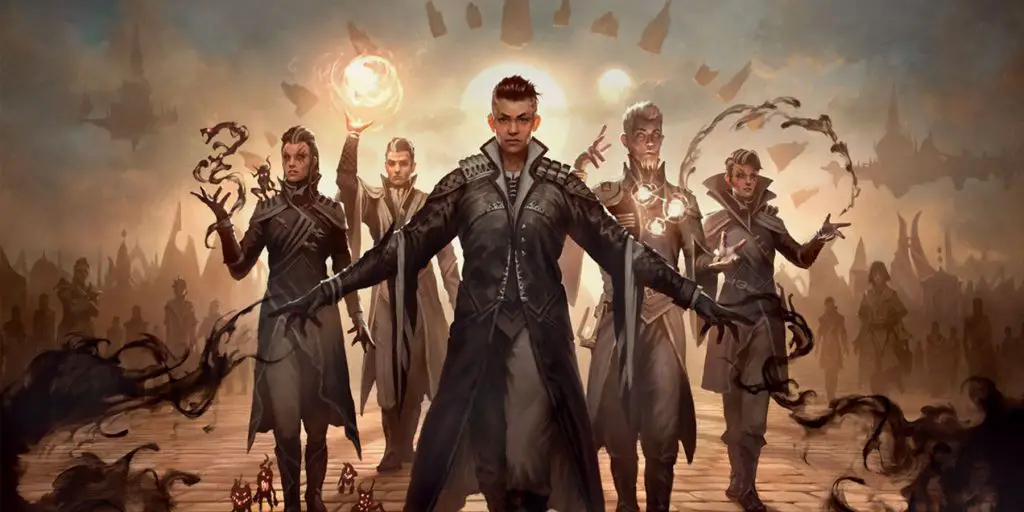
Umm… Phrasing?!
When using the Wish spell, you want to be very careful and specific with how you phrase your Wish.
Some things are generally pretty safe like duplicating a spell effect or the examples listed in the spell’s description.
It’s when you attempt to push a Wish beyond these “safe” examples that things can start to get a little weird. Generally speaking, the grander your Wish is, the more that could possibly go wrong and the worse that could be.
So choose your words carefully!
You might wish to be the strongest warrior in the land only to find yourself constantly attacked by people who want to claim that title for themselves. Not only could these be very formidable foes, but you’ll likely never have a moment of peace again!
Heard about a powerful magic item that you want to claim for yourself? If you aren’t careful with your wish, you could find the item (and the very angry dragon who is in possession of it) right in front of you. You might be teleported to the item’s location in the dragon’s hoard, or you might end up teleporting the dragon and the item to you!
Using Wish to make yourself the King or Queen of the realm? That’s possible, but what are you going to do about the gathering peasants who are currently going full “French Revolution” and coming to drag you to the guillotine?
If you’re going to use Wish for something exceptionally powerful and world-changing, it’s a very good idea to spend time talking about it with your party. Your wording should be as precise (but keep it succinct) as possible.
Work together to find a desired effect and phrasing that you think will be safe. Otherwise, you are casting this at your own risk!
If the party plans to cast the Wish spell and has the luxury of time, it might even be worth hiring some very intelligent NPCs to help craft the wording for the specific goal that you have in mind.
Make Time For Recovery!
If you use Wish for anything other than the “basic” use of duplicating another spell effect, you should be prepared to spend some time recovering.
Once again, this is some serious arcane energy you’re playing with! It’s going to take a physical toll on you!
If you use Wish for anything other than duplicating another spell’s effect, you’re weakened until you finish a long rest.
Until you’ve rested, casting any spell causes you to take 1d10 necrotic damage for every level of that spell. Furthermore, you can’t outwit this cost as the necrotic damage cannot be reduced or prevented in any way!
Oh, but it gets even more intense…
Your Strength score also drops to 3 for 2d4 days. Spending an entire day doing nothing but resting and light activities (like reading or such) counts as two days of recovery.
But lest we forget the greatest kickback of all…
Using anything more than the “basic” Wish comes with a 33% chance that you will never be able to cast the spell again as a result of the stress that comes with casting something so powerful.
This means “never” as in “never ever” being able to cast it again. I suppose someone else casting Wish might be enough to allow you to cast it again, but now we’re just getting silly with it.
The point is: casting Wish is going to render your character pretty much useless for nearly a week.
Combining that with the fact that you have a pretty good chance of this being your one and only casting of the spell, you really want to make sure that you make it count and have no plans while you recover afterward!
Fun fact: back in the days of 3e/3.5, using Wish had an extra cost of 5,000 xp (minimum and often more!) to cast it! Talk about a steep cost!
Limitations of Wish in D&D 5e
Beyond the recovery time and possibility of never being able to cast the spell again, Wish doesn’t really have any hard-set limitations.
The real limiting factor with the spell is that things might not go as you expect. It’s the classic proverb of “be careful what you wish for lest it comes true.”
You could wish for the destruction of all undead only to also wipe out anyone who had been previously brought back to life. This could very well include your party members or even yourself!
Perhaps you wish that the Demons who have been escaping the Hells to cause chaos on the Material Plane were forever trapped in the lower planes. But now the Devils have uncontested access to tempt and manipulate the mortals on the Material Plane.
So while there aren’t necessarily any specific limits on the Wish spell beyond what the DM rules, it’s the consequences of your wish that let you know where the limits truly ought to be.
To wax poetic for a moment, it’s a perfect example of my favorite bit from my favorite poet, William Blake: “the road of excess leads to the palace of wisdom, you never know what is enough until you know what is more than enough.”
Spoiler alert: there are very good odds that you’re going to visit the palace of wisdom sooner than you might think with the Wish spell!
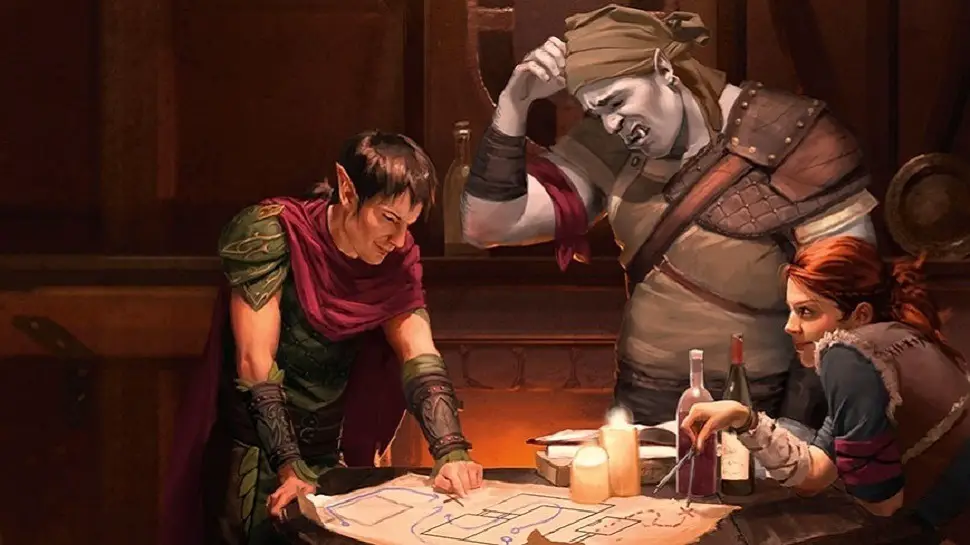
Wish Advice for Dungeon Masters
With a spell this powerful, it’s time for some real talk with the DMs out there. I’ve got 5 guidelines for DMs who are planning on giving their players access to the Wish spell.
It can’t be stressed enough how completely and entirely campaign-altering this spell is.
While there’s definitely a lot of fun in watching your players frantically try to figure out the perfect use of this spell, you also need to be prepared to be proactive. This could be the end of the campaign or this could set the stage for the most over-the-top adventure you’ll ever DM.
Plan Ahead
The biggest thing you need to do as a DM is to plan ahead.
The players gaining access to the Wish spell should not sneak up on you. By the time they’re level 17 and able to cast level 9 spells, you should have absolutely seen this coming and have a plan in place to make it work within the story.
In the case of a Wizard or Bard, where are they learning this spell from? Finding the necessary information to cast a spell as powerful as Wish could (and should!) be a quest in and of itself!
Furthermore, it’s likely that they’ll need to find parts of the spell in various locations. One part might be in a lich’s underground lair, another might be possessed by the Archmage in charge of a Mage’s Guild, and another could be stashed away in a dragon’s hoard.
Not only does this tactic add more narrative and excitement to the story while positioning the completed Wish spell as a MacGuffin, but it also gives the players more time to think about what they’ll use the spell for.
Related: Why and How You Should Be Using a MacGuffin In Your D&D Games
Ultimately, it will keep things moving while also giving you insights into what they’re thinking so that you can prepare accordingly.
In the case of a Sorcerer, having a mentor NPC who is able to help awaken the Wish spell within the sorcerer could achieve a similar effect. Perhaps they need some materials that are found in the locations I described.
If you start planting these seeds before the party is able to cast level 9 spells, it will feel natural to the story while also giving you plenty of time to properly plan for when they finally cast Wish.
Don’t Be a Jerk
Wish is one of those spells where the general view of it is, shall we say, antagonistic.
Look, I’m going to be real with you: this is a huge moment for the players so don’t be a jerk. Yes, it’s fun finding ways to turn wishes around on the person making it, but it just doesn’t make sense in this context.
If the party is making a deal with a diabolical genie, then go for it!
Are they making a deal with Moloch or some other powerful Devil? Then absolutely find a way to ultimately make them regret the deal.
But they’ve worked very long and hard to access the Wish spell and deserve to use it without having to hire a team of lawyers to make their Wish ironclad and DM-proof.
Now, with that said, I’m not saying that they shouldn’t face consequences from what they wish for. Consider the examples that I gave earlier. You might wish to be King, but does that make you a competent King? If not, it’s only a matter of time before the people rebel and drag you out of your castle!
At most, I’d say keep the grandest of wishes to a type of “malicious compliance” if you just absolutely have to mess with your players. But the intent behind the wish should count for a lot if for no reason other than keeping the game fun.
If you’ve planned ahead and listened to what your players are saying, you should be able to tell what it is that they’re trying to accomplish.

Be Clear
This is simple: speak directly and bluntly with the party.
Wish is a colossal spell and you might need to take off the DM hat for just a moment to really drive the point home. It’s not something to be taken lightly!
If you are clear and direct with the party about what Wish is, what it’s capable of, and what they should know about using it, it will go a long way.
Having NPCs who have helped the party piece together the secrets of the wish spell speak of legends of the spell’s power is a way that you can do this without having to pause the game.
If that’s not an option, then just remind your players how big of a thing this is then get back to the game.
Time Limits
I once had a group gain access to the Wish spell (as a type of MacGuffin) about 30 minutes into our weekly game.
What followed was about 3 hours of semantics trying to figure out the best way to word the specific wish in a way that wouldn’t backfire.
By the end of the first hour, my eyes were probably completely rolled back into my head. Having lost interest, I just started doodling in my notebook while offering occasional ideas meant to hopefully speed it along.
After 3 hours, the party decided on the wording of the Wish, cast the spell, effectively saved the world, and ended the campaign.
It wasn’t exactly a fun experience despite every session to that point being great. Especially with it becoming the end of the campaign, it just felt weird.
That’s why I recommend putting a time limit on the Wish spell. It has to be something (a sentence or two) that can be said in 6 seconds.
While the party is almost certainly trying to figure out how to word the Wish, take the initiative to help them. Remember: the DM is not the players’ enemy.
You don’t necessarily have to give the party ideas, but you can help their decision-making process. Saying things like “so, if I understand you correctly, it sounds like you guys are wanting to use this spell to make XYZ happen?” will help move the process along. Otherwise, it’s very likely that they’ll waffle on in circles for the entire session.
Once again, if you’ve had a good buildup to this moment, you should have some pretty good ideas of where the players’ heads are at.
Be Fair
This tip honestly just supplements the “Don’t Be a Jerk” guideline.
It’s a game and everyone is there to have fun. Trying to “pull a fast one” on the party isn’t going to go over particularly well.
But that doesn’t mean that there should be no logical results from the party’s actions.
When you make it a point to be fair in how you run a Wish scenario, you’re looking at the unbiased and logical results of whatever the party used their Wish on. Sometimes this might be quick and easy while other times it may require you to take a whole week to consider how various sections of the world have been impacted.
It’s like getting rid of all the snakes in a town only to have it get completely overrun by rats. Nobody is going to be justified in saying “That’s not fair!” Instead, there’s a certain level of “Oh… I didn’t think about that…”
Grant the wish but keep the consequences focused on the natural and logical progression of things. It shouldn’t feel like the consequences are solely meant to victimize the party.
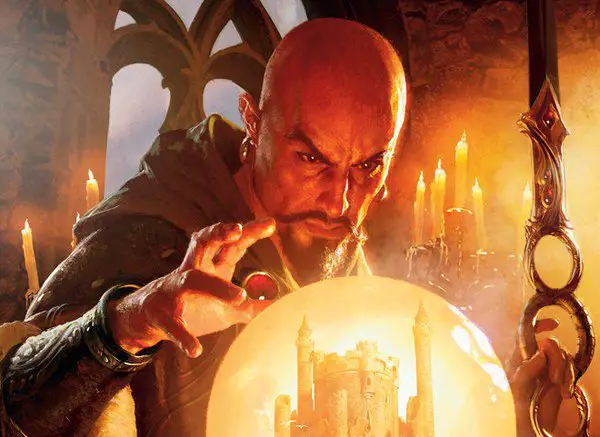
The Wish Spell in D&D 5e – Frequently Asked Questions
Because the Wish spell is almost limitless in what it’s able to do, there are tons of questions about it. Not all of these fit neatly into the above article, so I wanted to make this section to hopefully answer some of the most common questions.
If you still have questions regarding the Wish spell, don’t hesitate to reach out in the comments! As always, I’m happy to help and there are certainly other people who would benefit from you asking!
How Many Times Can You Use Wish?
The number of times that you’re able to use Wish depends on what you’re using it for.
If you use Wish to duplicate another spell’s effect, it functions as a typical level 9 spell that you can use once per long rest.
Using Wish for anything other than duplicating a spell effect takes more of a toll on your character though. As I mentioned in the “How To Use The Wish Spell” section, you want to make time for recovery after casting it like this.
The biggest risk here is that you have a 33% chance of never being able to cast the Wish spell again. The Wish can still work, but if you roll a 33 or lower on the percentile dice, that’s the last time you’ll be able to cast it.
So choose your Wishes carefully!
Does Wish Upcast Spells?
You can absolutely use the Wish spell to cast spells at a higher level than they typically are (also known as upcasting.)
Let’s say you’re fighting the BBEG and you’ve exhausted most of your spell resources. To make matters worse, you’ve taken a beating, your hp is getting low, and the party’s primary healer is down.
The cherry on top: you didn’t prepare any damage spells that can help you in this situation.
Hindsight is always 20/20, eh?
You look at your character sheet as you try to plan your next move. You’ve got a few level 1 slots, a level 2, and that use of Wish you’ve been holding on to.
Things are looking grim as the BBEG and his minions close in on your party.
Looking at the initiative order, they’re right after you. If you can’t do something big, the entire party is almost certainly going to go down. It’s time for a Hail Mary…
The DM looks at you.
“It’s your turn.”
Because Wish can duplicate any spell effect of level 8 or lower, you use it to cast a Fireball at level 8. The enemies were grouped together and weakened from the battle so far. As everything in a 20-foot radius takes 13d6 fire damage, your surprise Fireball manages to clear the field.
The party tends to their wounds and takes a deep breath having just avoided certain defeat.
Don’t downplay the value of upcasting spells!
(Also maybe keep a fireball up your sleeve in the future, just in case…)
Does Wish Ignore Casting Time and Material Components?
The Wish spell has a casting time of 1 action and can duplicate the effect of any other spell. This means that it is possible to use the Wish spell to duplicate the effects of a spell that would typically have a longer casting time.
Additionally, the Wish spell ignores the requirement for costly material components to create effects in this way.
For example, the Simulacrum spell is a level 7 illusion spell that typically requires 12 hours to cast and 1500gp worth of powdered rubies.
If you use Wish to duplicate the Simulacrum spell’s effects, it only takes one action and doesn’t require materials. You simply wish for an awesome clone/construct of yourself and it appears.
While it’s ultimately up to your DM, this could potentially also be used to set up a permanent teleportation circle. Typically this would require you to cast the Teleportation Circle spell on a spot every day for a year.
Considering how powerful Wish is, it’s not much of a stretch (in my opinion) to use it to set up a permanent teleportation circle for quick traveling instead of spending an entire year trying to build it.
Can Wish Turn You Into a God?
It’s hard to imagine an effect more powerful than turning someone into a full-blown deity.
If you’re looking to use the Wish spell to ascend to godhood, that entirely falls to your DM to decide.
Personally, I might be tempted to allow a character to become a lesser deity with the Wish spell. However, the pure chaos that would follow from such a sudden ascension would be a spectacle like none other.
Not only does this throw various pantheons into disarray, but it would also require the character to have developed a reasonably large amount of followers. No followers/worshippers = no powers = no real godhood.
Is it possible? Maybe.
Would the supreme powers that be take an active interest in stopping this from happening? Definitely.
Even if you do defy the wishes of the gods themselves, amass a sizeable group of followers, and use Wish to make yourself into a god, that’s far from the end.
As the good deities likely view this as sacrilege and are upset that you’ve ignored their advice/orders/pleas to stop your quest, you probably won’t exactly get along with them.
This means you’re probably more likely to find yourself attracting evil deities who are more accepting or encouraging of selfish ambitions. If that’s the company you’re looking to keep for all eternity, then so be it.
Of course, even if all of that happens, there’s really only one way that that’s going to manifest at the table: you’ll be making a new character as your old one now becomes an NPC deity.
So while it’s ultimately up to the DM to determine if this adds to the story, you’ll want to also ask yourself if this is something your character really wants.
Can You Use Counterspell on Wish?
You’ll want to use Wish in a safe environment free from other casters who might seek to stop you from using the spell.
It is possible to use Counterspell on someone who is casting the Wish spell. However, only a Counterspell cast at level 9 is guaranteed to prevent the casting.
Conclusion – The Wish Spell in D&D 5e
The Wish spell is incredibly divisive. Some love it and view it as the ultimate arcane reward. Others hate it and think that it pretty much only leads to chaos at the game table.
Frankly, in my experience, the vast majority of wishes result in the end of the campaign or the character who made/received the wish simply becoming an NPC.
If you wish for riches and wealth, why should you bother adventuring now? If you gain infinite knowledge, what need do you have for treasure and adventure?
Used as a device for advancing the group’s story, Wish can be a powerful motivator. If it’s used carelessly or without planning, you’re just asking for trouble.
That said, almost everyone has a story about how the Wish spell went in one of their games.
Share your Wish story in the comments! I’d love to read it!

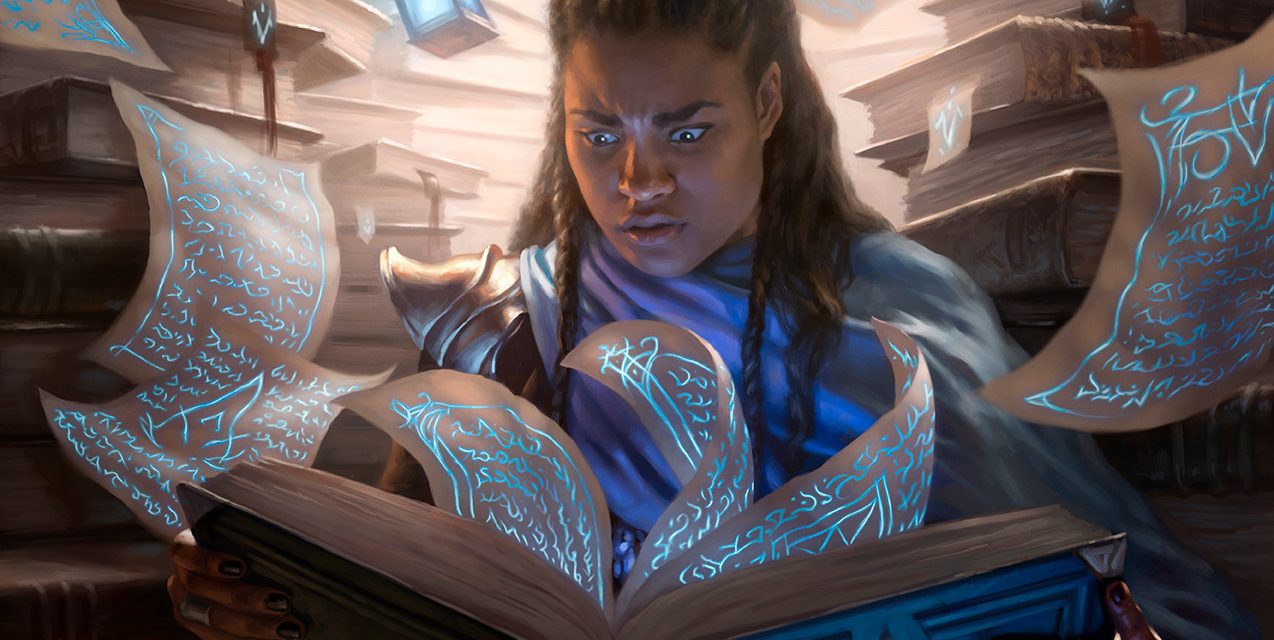


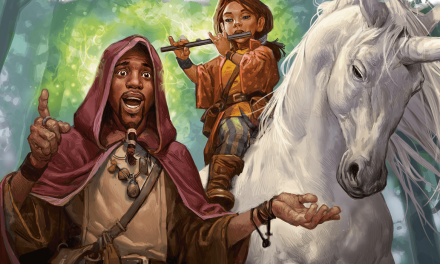






Clerics of the Arcane domain from SCAG gain access to wish with their lvl 17 feature
Hi Sean!
Can’t believe I forgot that domain, haha. Article updated!
Thank you for reminding me!
pact of the genie (the best warlock subclass) warlock gets wish too.
wups never mind you already got it i must have missed it. sorry
Hi Parker!
No worries! 🙂 Genie Warlocks are AMAZING!
Hey, for wishes with potential consequences I thought it would be cool to roll for a chance to avoid the consequences. Do you have any advice on how to adjudicate this?
Hi Jeremy!
That’s an interesting idea for approaching the Wish spell.
If you want to leave the Wish’s interpretation to fate, you could make a table and roll a d100.
Based on the table, you could maybe give it a 35% chance of working as intended, 30% chance of a minor (but good) unexpected side effect, 30% chance of a minor (but bad) unexpected side effect, and a 5% chance of either a bad effect or the spell misfiring and nothing happens.
As a level 9 spell, you do want to skew in favor of the player. They’ve worked hard to get to the point of being able to cast it!
The trick comes in with trying to add effects/consequences that are meaningful but generally fit pretty much anything the player could wish for.
Alternatively, you could have the player make an Arcana check when casting the spell where the Arcana check’s DC is based on the scope of their wish. (Factoring in that a level 9 caster is VERY powerful.)
“I wish everyone that died because of the lich’s undead army was brought back to life” = DC 17 Arcana check (failing check means maybe not all of them are restored to life.)
“I wish that nobody would get trapped in the Domains of Dread ever again.” = DC 30 Arcana check (Could reduce the amount of people who get lured/trapped there if the check fails.)
I’m just spitballing these ideas, but it’s given me something interesting to think about!
Hope this helps! 🙂
A Rogue in the party that play in found a Luckblade. He used the one wish to give all of the characters in the party a choice to add any single feat to their characters abilities. A helpful boon to each character, but not a campaign, adventure or character killing wish.
Hi Daniel!
Oh that’s a great idea (and a very generous/considerate one at that on his part!)
While people usually think of Wish as colossal, campaign-defining/changing/ending moments, there’s still a ton of value in wishes like that. It gives a nice buff to everyone and lets the adventure still continue!
Love it!